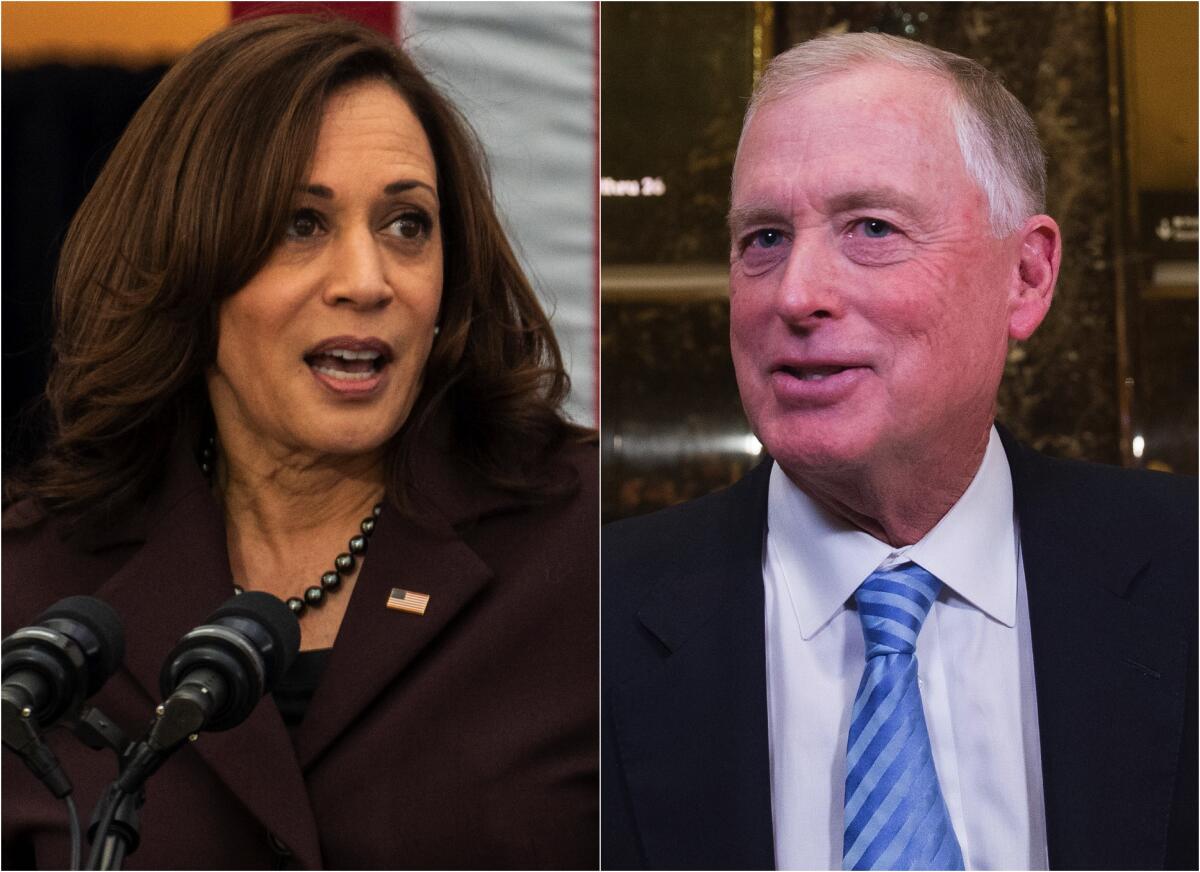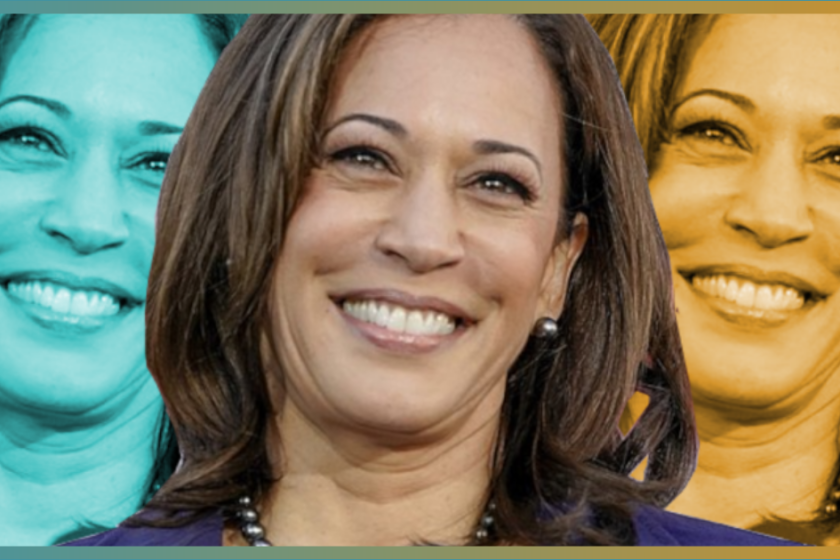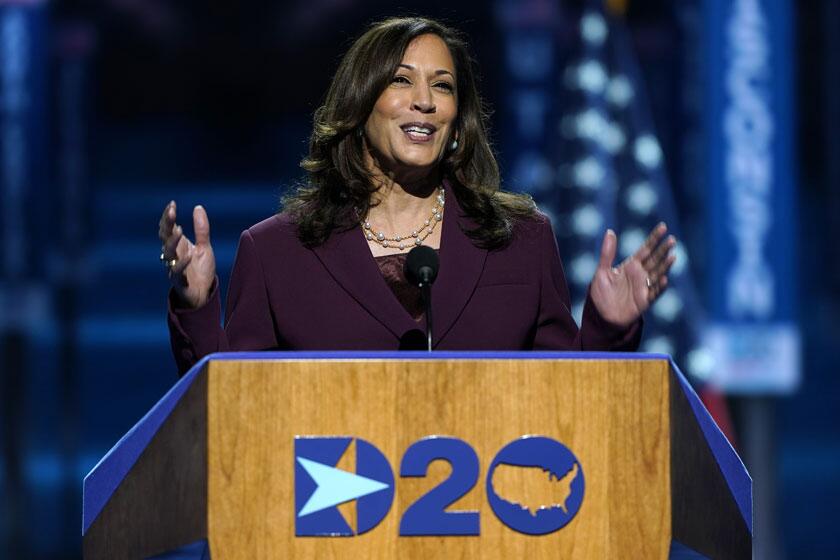Column: So you think Kamala Harris has it rough. Remember Dan Quayle?

- Share via
Kamala Harris can’t catch a break.
When she’s not being ignored — which is much of the time — the vice president is portrayed as inept, impossible to work for or depicted as an anchor weighing down the listing Biden administration.
Sometimes all three.
She goes to Paris on a well-executed goodwill tour and critics jump all over Harris for spending $500 or so on fancy cookware. The money came from her own pocket — the vice president loves to cook — and is about $129,500 less than President Trump paid trying to cover up an extramarital affair but, sure, whatever.
On cable TV, the judge-and-jury panelists dissect turnover in Harris’ office, plumb her relationship with President Biden and parse the tensions between their respective staffs. Political forecasters float the names of challengers to Harris if, as expected, she runs to succeed Biden when he leaves office.
It may seem harsh. But it’s not unusual.
If it seems like Kamala Harris has vanished, it’s because she’s doing her job of not upstaging President Biden.
Harris is, of course, a historic figure. That means heightened interest in her performance and expectations that vastly exceed her circumscribed position. But the idea the vice president is the victim of an extraordinarily hostile press corps, or is being singled out solely because she is a woman of color, holds about as much water as a demitasse.
Ask those who recollect the eight years George H.W. Bush served as vice president. He was routinely depicted as a syntax-mangling sycophant of the alpha-male President Reagan, emitting what columnist and conservative tastemaker George Will witheringly called the “thin, tinny ‘arf’ ... of a lapdog.”
Or better still, ask Bush’s vice president, Dan Quayle, who spent much of his four years in the White House as the rep-tied, apple-cheeked butt of countless jokes, from which his reputation never recovered.
“I remember one particular visit, a domestic trip to Rochester,” said David Beckwith, who served as Quayle’s vice presidential press secretary. “The headline of the paper was, ‘Quayle fails to make gaffe.’”
Oof.
No doubt some of the criticism Harris faces is the product of racism, sexism or some poisonous combination of the two. Anyone who doubts that is welcome to pull on their waders and slosh around the darker, danker portions of the internet.
And she faces a very different environment than the one that existed before the turn of the century, with the proliferation of cable news networks, a weaponized right-wing media complex and the bottomless maw of Twitter and other fire starters.
But the fundamentals haven’t changed. The vice presidency is an inherently subordinate position and one that sits ripe for ridicule. The experiences of Bush, and especially Quayle, show that denigrating the office and its occupant isn’t a matter of race, partisanship or personal background. Indeed, it’s something of a national pastime.
It’s hard to remember Quayle as the political wunderkind of Indiana politics, a deft campaigner who defeated the venerable Democratic Sen. Birch Bayh and turned himself into a respected student of arms control, among other legislative arcana. All that was swept away the instant Bush unveiled Quayle as his vice presidential pick in August 1988 and the 41-year-old lawmaker took to the national stage, hopped up like a game-show winner on speed.
Quayle was immediately consumed by a controversy over his Vietnam War-era National Guard service, among other tempests, and was kneecapped in the one vice presidential debate, where Lloyd Bentsen devastatingly gibed, “You’re no Jack Kennedy.”
By the time he took office, Quayle’s image as an intellectual lightweight and serial bumbler was sealed. He took on the fictional Murphy Brown and her decision to have a baby out of wedlock, then made a mash of the word “potato.” (Working off an erroneous flash card, he added an extraneous “e” during a stop at a New Jersey elementary school.) That only reinforced the worst many believed about Bush’s understudy.
The vice presidency, alas, is a tough place to stage a comeback.
“If you start off behind the 8-ball a little bit and you’re a governor or even a senator, you can sort of fix it because two years later, if you’ve been a good governor, people will say, ‘OK, I guess that first impression wasn’t quite right,’” said conservative commentator Bill Kristol, who served as Quayle’s chief of staff.
But how, he went on, does a vice president turn things around? “You can’t take credit for major things that the president [achieves],” Kristol pointed out, “and you don’t want to bigfoot Cabinet secretaries too much and say, ‘I’m really in charge.’”
The exodus of staffers is the latest clear sign that Kamala Harris is an awkward fit for the job.
Bush was ushered into the 1988 presidential campaign by a Newsweek magazine cover calling him a “wimp,” but remade his reputation by prevailing in a fierce fight for the nomination and delivering a soaring speech at the Republican National Convention. Quayle tried for the White House a decade later, but quit the race before the first votes were even cast. (He did not respond to requests for an interview.)
It’s impossible to know how Harris, who fared poorly in a 2020 bid for president, will do in a second attempt. It’s also too soon to deliver a meaningful assessment of her vice presidency.
“To prognosticate now is like judging a runner in the first lap or first quarter-mile of a race,” said Joel Goldstein, an emeritus professor at St. Louis University and expert on the office. “There’s a long way to go.”
There’s not a great deal Harris can do as vice president to burnish her image and erase doubts about her aptitude and political capabilities. That may happen when, and if, she seeks the Democratic nomination and starts winning contests. Success is a magical potion, with enormous transformative power.
In the meantime, it’s going to remain a rough go for the country’s trailblazing vice president.
More to Read
Get the latest from Mark Z. Barabak
Focusing on politics out West, from the Golden Gate to the U.S. Capitol.
You may occasionally receive promotional content from the Los Angeles Times.













